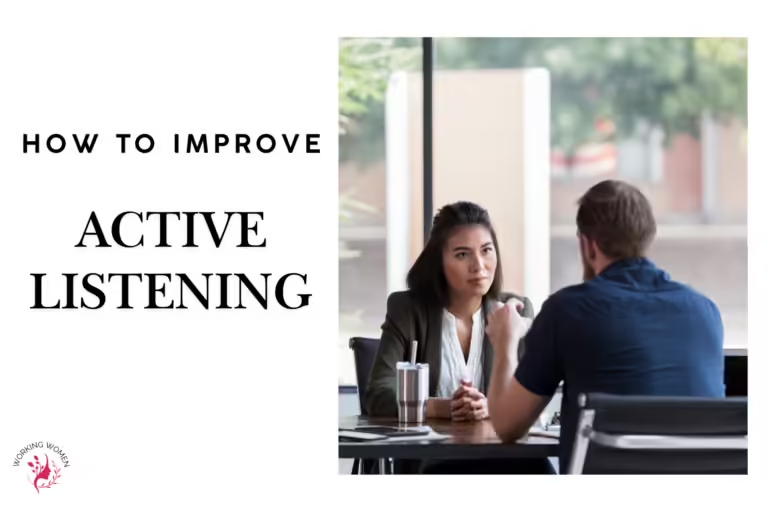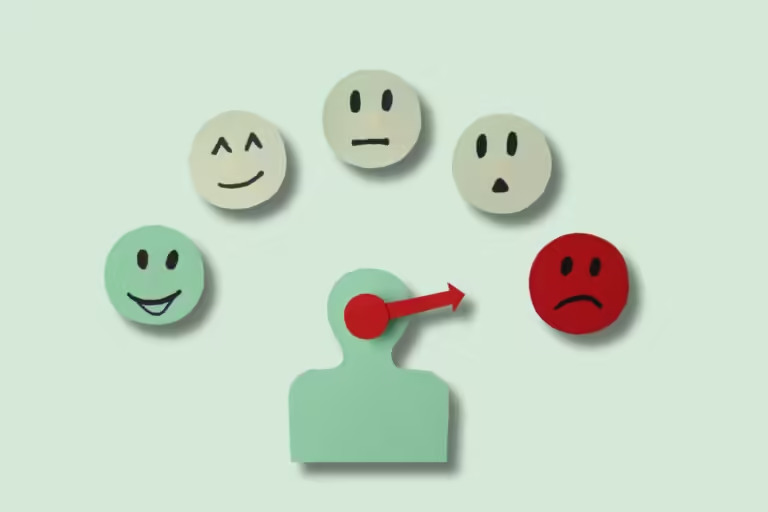6 Secrets of Emotionally Intelligent People
Does your workday sometimes feel like an emotional rollercoaster? Between juggling deadlines, managing difficult personalities, and battling those moments of “do I even belong here?”, staying balanced as a working woman can be tough. Imagine if you could approach each challenge with clarity and calm.
Emotional intelligence is the secret weapon that can do just that. In this article, we’ll uncover the 6 habits of emotionally intelligent people, giving you the tools to build stronger relationships, boost your confidence, and find fulfillment in both your career and life outside of work.
Table of Contents
Habits of Emotionally Intelligent People
Transform your professional life and personal well-being. Navigate the workplace with grace and confidence. Learn key traits of highly emotionally intelligent people, and tips how you can practice and develop.
Self-Awareness
For emotionally intelligent people, self-awareness is the foundation upon which other crucial skills are built. It means having a clear and honest understanding of your emotions, strengths, weaknesses, and values, and how they impact your thoughts and behaviors. With better self-awareness, you better
- Identify your triggers: (Situations or people that evoke strong emotional responses within you)
- Understand your biases ( Be mindful of how your past experiences and beliefs might shape how you perceive situations)
- Manage your Reactions (Choose how you respond to challenging circumstances instead of reacting impulsively)
Remember, Self-awareness is not about eliminating emotions but giving you the space to make intentional choices about how to respond. Emotionally intelligent people understand this power of self-awareness. Several studies have evaluated the benefits of self-awareness on job performance, highlighting its importance in the workplace.
Example
Imagine you’re in a meeting where a colleague presents an idea that directly contradicts a project you’ve been working on for months. You immediately feel a surge of anger and defensiveness.
- Without Self-Awareness: You might lash out, criticizing their idea without considering its merits, or withdraw completely, feeling defeated and resentful.
- With Self-Awareness: You recognize the anger rising within you, acknowledge the hard work you’ve done, and then take a deep breath. You choose to ask clarifying questions about the colleague’s proposal to understand their perspective better, leading to a more productive discussion.
Tips to Develop this skill
There are several ways you can be increase awareness of yourself. Developing self-awareness is like turning on a light within yourself. Start with simple mindfulness practices to observe your thoughts and feelings without judgment. Journaling helps you identify patterns and triggers, while seeking feedback from trusted individuals offers valuable external perspectives.
Remember, self-awareness is a journey, not a destination. Emotionally intelligent people continually cultivate this skill, and with consistent practice, you’ll gain a deeper understanding of yourself, leading to greater emotional control and stronger relationships in both your personal and professional life.”
Self Management
Self-management is the ability to regulate your emotions, thoughts, and behaviors to achieve your desired goals and outcomes. It’s about being the captain of your ship, navigating challenges, and staying on course.
A recent study, (2020) conducted by Green State University, USA provides a direct correlation between self-management and enhanced work performance. It is a most crucial tool in the toolkit of emotionally intelligent people.
Key components of self-management include:
- Impulse Control: Resisting the temptation to react impulsively, especially in emotionally charged situations.
- Time Management: Prioritizing tasks effectively, avoiding procrastination, and creating a structure that supports your goals.
- Stress Management: Developing healthy coping mechanisms to handle stress and prevent burnout.
- Organization: Maintaining systems, both mental and physical, to reduce chaos and promote efficiency.
- Adaptability: Being flexible and adjusting to unforeseen circumstances with a resourceful mindset.
Example
Imagine you work in customer service and encounter a very angry customer with a complicated issue. They become increasingly frustrated, raising their voice and even making personal remarks.
Without Self-Regulation: You might get defensive, match their anger, or even shut down and become disengaged. This escalates the situation and doesn’t solve the customer’s problem.
With Self-Regulation: You recognize your own rising frustration but take a few deep breaths to stay calm. You actively listen to the customer, empathize with their situation, and focus on finding a solution. Even if they remain agitated, you maintain professionalism and provide the best possible service.
Tips to Develop this skill
Start by becoming aware of your body’s signals when emotions rise, and learn to name what you’re feeling. Practice simple calming techniques like deep breathing or focusing on your senses to manage strong reactions in the moment.
Remember, suppressing emotions can be harmful. Instead, practice acknowledging your feelings without judgment, and finding healthy ways to process them, even if you can’t express them fully in the moment. Later, allow yourself time to revisit the situation and work towards emotional resolution. Find healthy outlets for emotional expression, and prioritize sleep and a healthy lifestyle to support your overall well-being. With consistent practice, you’ll gain greater control over your reactions and navigate challenging situations with more composure, a key trait of emotionally intelligent people.
Social Awareness
Social awareness is the ability to accurately perceive and understand the emotions, thoughts, and perspectives of others. Emotionally intelligent people excel at picking up on social cues, understanding group dynamics, and navigating different social situations with sensitivity and tact. Key components of social awareness include:”
- Empathy: The ability to put yourself in another person’s shoes and understand their feelings, even if you don’t share them.
- Nonverbal Decoding: Accurately interpreting facial expressions, body language, and tone of voice to understand unspoken messages.
- Cultural Sensitivity: Recognizing and respecting differences in values, beliefs, and communication styles across diverse groups.
- Social Insight: Understanding the unspoken rules and dynamics within a group or organization.
Emotionally intelligent people recognize that strong social awareness is crucial for building strong relationships, effective communication, conflict resolution, and inspiring leadership.
Example
Imagine you’re in a team meeting discussing a new project. While the project lead is enthusiastically outlining their idea, you observe:
- A few colleagues exchanging skeptical glances.
- One team member fidgeting and avoiding eye contact.
- A subtle sigh from someone usually quite supportive.
These nonverbal cues suggest there might be unspoken concerns or disagreements within the group. Having social awareness allows you to respectfully voice these observations, creating space for a more productive and inclusive discussion.
Tips to Develop this skill
Emotionally intelligent people possess keen social awareness. They understand the power of nonverbal cues, listen attentively, and cultivate empathy by seeking diverse perspectives.
Related: Body Language Hacks
To develop your social awareness, actively observe your surroundings, consider others’ motivations, and seek feedback on your interactions. Remember, building social awareness takes practice, and it’s a skill that will enhance your communication and relationships throughout life.

Relationship Management
Relationship management is the art of effectively building, maintaining, and leveraging positive relationships with others. According to Harvard Business Review, Emotionally intelligent people excel in this area, fostering trust, mutual respect, and collaboration, essential for success in both personal and professional spheres. Core components include:
- Strong Communication: Open, honest, and clear communication is the foundation of healthy relationships. This involves active listening, effective conflict resolution skills, and the ability to express your needs respectfully.
- Empathy and Understanding: Cultivating genuine empathy allows you to understand others’ perspectives, needs, and motivations, promoting stronger bonds.
- Collaboration: Working effectively with others towards common goals, valuing diverse contributions.
- Trustworthiness: Behaving with integrity, keeping promises, and demonstrating that you are reliable and dependable.
- Conflict Resolution: Addressing disagreements constructively, seeking solutions that benefit everyone involved.
Example
You attend an industry event hoping to build your professional network.
- Poor Relationship Management: Focusing solely on promoting yourself and handing out business cards leaves a shallow impression.
- Effective Relationship Management: You genuinely connect with people, seeking to understand their interests and how you could potentially offer value. This leaves a positive impression and lays the foundation for mutually beneficial connections.
Tips to Develop this skill
Developing strong relationship management skills is essential for both personal and professional success. Focus on open communication, active listening, and building trust through consistent actions. Cultivate your empathy to better understand and connect with others.
Invest time and effort in your relationships, offer genuine support, and express gratitude. Remember, like other skills this skill is an ongoing journey. Emotionally intelligent people continually nurture this ability, and with practice and dedication, you’ll create strong, fulfilling connections in all aspects of your life
Assertiveness & Boundaries
Assertiveness and boundaries are crucial skills for navigating relationships with confidence and respect – for both yourself and others. Let’s break them down:
Assertiveness: The ability to express your needs, opinions, and feelings clearly, directly, and respectfully. It’s about advocating for yourself while acknowledging the rights of others.
Boundaries: The physical, emotional, and mental limits you establish to protect your time, energy, values, and overall well-being. Healthy boundaries separate what you are responsible for from what you are not.
Assertiveness and boundaries are not about being selfish. They’re about creating healthy, balanced relationships where everyone’s needs are respected. They protect your well-being, prevent burnout, foster healthy relationships, and boost your self-esteem and make you among highly Emotionally Intelligent people. A Columbia University study highlights assertiveness as a major factor in leadership effectiveness, demonstrating its importance for those seeking to lead and influence others.
Example
Imagine you have a friend who often calls you for emotional support, sometimes for hours late at night. While you care about them, these calls are draining you and impacting your sleep.
- Without Assertiveness & Boundaries: You continue to take the calls, feeling increasingly resentful and exhausted.
- With Assertiveness & Boundaries: You kindly tell your friend that while you value their friendship, you need to prioritize your sleep. You establish a boundary by offering your support during specific hours or suggest alternative resources for late-night crises.
Tips to Develop this skill
Developing assertiveness and boundaries starts with self-awareness. Identify situations where you struggle to speak up or say “no.” Practice using “I” statements to express your needs directly (“I feel overwhelmed when…”). Start with small boundaries, gradually increasing your comfort level. Be clear and consistent in communicating your limits.
Remember, it’s okay to prioritize your well-being, and healthy boundaries foster respect in your relationships. Seek support if needed, a therapist or assertiveness workshop can provide personalized guidance and practice.
Have Balance Life
Emotionally intelligent people prioritize a balanced life. They understand that true fulfillment comes from nurturing their professional goals alongside their personal well-being. By setting boundaries, staying attuned to their needs, and making time for self-care, they prevent burnout and cultivate a sustainable, resilient approach to work and life.
Example
Imagine a devoted parent who is also deeply invested in their career. They excel at work but find themselves increasingly short-tempered at home, often too exhausted to truly connect with their children or partner.
An emotionally intelligent approach would involve:
- Self-awareness: Recognizing how their work stress is impacting their family relationships.
- Prioritization: Setting aside dedicated time for quality connection with their children and partner, fully present and free from work distractions.
- Communication: Openly talking to their partner about their needs and working together to find solutions that create a more balanced family dynamic.
Outcome: By prioritizing balance, they can prevent resentment within their family, deepen their connections, and model healthy emotional management habits for their children.
Conclusion
Emotional intelligence isn’t a fixed trait but a set of skills that can be learned and strengthened. Emotionally intelligent people prioritize self-awareness, manage emotions wisely, cultivate empathy, master social interactions, embrace motivation, and foster balance. Remember, this journey is about progress, not perfection. Embrace the process, and you’ll reap the rewards of stronger relationships, increased resilience, and greater success in all areas of your life.
FAQs
Emotional Intelligence (EQ) is the ability to understand, use, and manage your own emotions while also recognizing and responding effectively to the emotions of others. It involves skills like self-awareness, emotional regulation, empathy, social awareness, and the ability to build strong relationships. Unlike IQ, EQ is dynamic and can be improved over time, leading to greater success and fulfillment in both personal and professional life.
Emotionally intelligent people often demonstrate self-awareness, manage their emotions effectively, and navigate social situations with tact. They listen with empathy, resolve conflicts constructively, and inspire those around them. While no one is perfect, if someone consistently makes you feel understood, valued, and supported, they likely possess a high degree of emotional intelligence.
Emotional intelligence is vital for both personal and professional success. It fosters self-awareness, resilience, and strong relationships. Emotionally intelligent individuals make better decisions, navigate social situations effectively, communicate clearly, and build strong teams. Ultimately, emotional intelligence enhances overall well-being, increases life satisfaction, and empowers you to positively influence those around you.
Unlike IQ, which remains relatively stable, emotional intelligence is a set of skills that can be developed and strengthened over time. With dedication and practice, you can enhance your self-awareness, emotional regulation, empathy, and social skills. This requires effort, seeking feedback, and consciously applying new strategies in your daily interactions. While some people may be naturally more inclined towards emotional intelligence, everyone has the potential to improve.
Emotionally intelligent women often demonstrate self-awareness, manage their emotions effectively, and navigate social situations with grace. They listen with genuine empathy, confidently express their needs, and resolve conflicts constructively. These women often inspire and uplift those around them. While these signs are not exclusive to women, if a woman consistently makes you feel understood and valued, she likely possesses a high degree of emotional intelligence.






